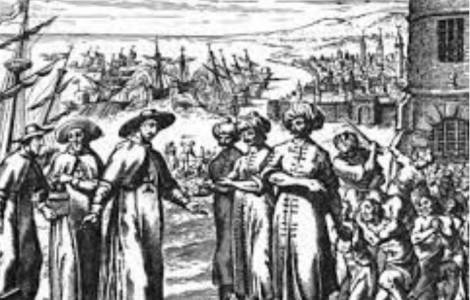
Manama (Agenzia Fides) - "I am the first Trinitarian to arrive in Bahrain. Only after me did the others come and we founded a community," said Vicar Apostolic of Northern Arabia Aldo Berardi, first bishop of the Order of the Most Holy Trinity and the Captives (O.SS.T.) in the Gulf. Last Saturday, November 4, the Bishop presided over the solemn Mass marking the opening of the Holy Door of the Cathedral of Our Lady of Arabia in Awali on the occasion of the Jubilee called to celebrate the 1500th anniversary of the martyrdom of the Saints Arethas and fellow martyrs (see Fides, 20/10/2023). "As Trinitarians," he emphasized in an interview with Fides, "we stand between monasticism and apostolate in the world. We look back on a long tradition that began shortly before St. Francis of Assisi and which we have continued for centuries, despite the enormous difficulties that we often encounter."
Known as the Order of the Trinitarian Fathers, defined as "redeemers" for their specific charisma of redeeming Christian prisoners who were kidnapped or subjected to conditions of slavery. They were the first religious family to undertake this unique mission. They were followed by the Mercedarians, founded in Spain. "A very well-known person redeemed by the Trinitarians was the Spanish writer Miguel de Cervantes," says Bishop Berardi, "who was captured after the Battle of Lepanto and held prisoner in Algiers for a few years until the Fathers took him to Spain. After his liberation, he wrote Don Quixote. His remains are in the convent of San Ildefonso and San Juan de Matha of the Trinitarian Sisters in Madrid. At that time the Monastery was a hostel for the Trinitarian nuns who were not allowed leave and lived in the monasteries as Trinitarian Mothers. Later, other apostolic women's congregations emerged, which are still very active."
In the long history of the Order, the Fathers had to overcome many difficulties over the centuries, they were expelled from many countries and finally had to start over. "After the Second Vatican Council," explains the Vicar Apostolic, "a socio-political study of the situation was carried out within the Order and a return was made to a concept of 'redemption' that was applied to modern slavery. The charism was reactivated, and in the last phase we returned to our origins; with the increase in situations of persecution, we began to intervene again in many difficult situations. The charism of the Trinitarians was a path that went from very practical, then more spiritual, then practical again and finally back to the original charism that calls us to help persecuted Christian communities to preserve the faith where they are."
Bishop Berardi entered the Seminary in France at the age of 16, "and it was already a little late, because my parents did not want me to enter". After studying at the Seminary of Villers-lès-Nancy for the diocese of Metz, he chose two years of community service instead of military service and went to Madagascar, where he met the Spanish Trinitarians in the missions of the diocese of Tsiroanomandidy: “I saw the commitment of the missionaries in everyday life: they went out to help the local population, to whom they then left all the work they had started to go to other more remote places where there was more need. I particularly liked this spirit". Back in France, Berardi entered the novitiate and then continued his theological studies and formation in Canada and Rome and was sent to Sudan and Egypt. "From there," Bishop Berardi recalls today, "we became Trinitarians also with the help of the Comboni missionaries, help the Sudanese Christians, save children, open schools for orphans and get involved as much as possible. After spending eight years in Egypt, I came to the Vicariate of Arabia, as it was then called, and stayed there longer and longer until I received a permanent visa." The Trinitarians' intention was to live in communities in the Gulf States to work where there were no priests. "I was there for ten years and then was elected a member of the general leadership. Unfortunately, during the years of the pandemic, everything came to a standstill because of Covid," said the Vicar Apostolic.
"Today the Order of the Trinitarians has a training center in Vietnam, sisters in China and has recently also been present in Morocco," he affirms. Young members of the order are preparing to go to Nigeria. In Morocco, Bishop Berardi, together with other members of the Trinitarian religious family from all over the world, took part in the meeting organized in April (see Fides, 20/04/2023) to follow the footsteps of the former 'redeemers' who went to North Africa to redeem the Christian slaves who were oppressed by Muslim masters. "It was a very beautiful experience," says the bishop, "with over a hundred believers following in the footsteps of the redeemers in past centuries who arrived in Morocco as far as Meknes. We have the report on all the freed slaves"
The Order of the Holy Trinity was founded in 1994 in Cerfroid near Paris by Saint Juan de Mata to free Christian prisoners (prisoners of war in Muslim hands). Felix of Valois is considered to be the co-founder of the order. Pope Innocent III approved the Rule of the Order of the Holy Trinity and the Captives (Ordo Sanctae Trinitatis et captivorum) (AP) (Agenzia Fides, 7/11/2023)